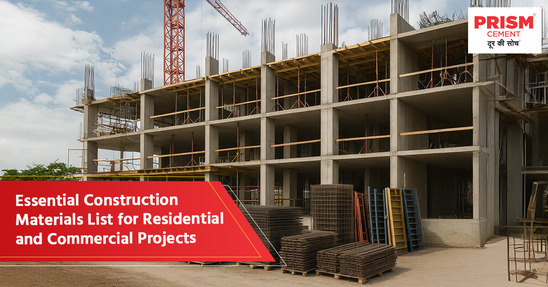
Essential Construction Materials List for Residential and Commercial Projects
When it comes to construction projects, whether it's residential construction or large-scale commercial construction, the materials used play a crucial role in ensuring the durability, safety, and aesthetics of the building. From building materials used for foundations to the finishing touches on the interior, each material has a specific function that impacts the overall quality and performance of the structure. In this blog, we'll explore an essential construction materials list for both residential and commercial construction.
The quality directly influences the structural integrity and longevity of any building. Whether you're working on a house construction project or a commercial construction, the right materials ensure that the structure is stable, functional, and safe for its intended use. Materials such as cement, steel, bricks, and wood are essential in creating durable and reliable buildings. Additionally, using high-quality materials can help prevent issues like cracking, water seepage, or mold formation, thus saving your time and money on repairs down the line.
While the construction materials list for both residential construction and commercial construction may overlap, some materials are more suited to one type of construction over the other. Commercial construction often requires materials that are designed to handle higher traffic, more significant loads, and complex systems, while residential construction typically focuses on comfort, aesthetics, and efficiency.
Here’s a look at some of the key differences:
Residential construction often involves a range of materials designed for safety, comfort, and aesthetic appeal. Below are the essential materials you'll need for house construction:
The foundation of any house is crucial for its structural integrity. Common foundation materials include:
Walls and partitions are essential for creating rooms and spaces. The primary materials used include:
Roofing is essential in protecting the structure from external elements like rain, heat, and cold. Common materials include:
Choosing the right flooring materials is essential for both functionality and style. Options include:
Finally, the finishing touches are what make a house feel like a home. These materials include:
When it comes to commercial construction, the materials are selected for their ability to endure heavy use and withstand the demands of commercial spaces. Here's an overview of essential materials:
The structural frame is the backbone of any commercial building. Essential materials include:
The exterior of commercial buildings requires durable and aesthetically pleasing materials, such as:
Commercial buildings require materials that are resistant to the elements which includes:
For high-traffic areas, flooring materials need to be durable and easy to maintain. Common options include:
Depending on the purpose of the building, there may be a need for specialized materials such as:
| Material Type | Residential Construction | Commercial Construction |
| Structural Frame | Concrete, Steel | Steel, Reinforced Concrete |
| Cladding and Facade | Bricks, Tiles, Paint | Glass, Aluminum, Stone Veneer |
| Roofing | Asphalt Shingles, Metal | EPDM Rubber, Metal, Waterproof Membranes |
| Flooring | Tiles, Wood, Vinyl | Concrete, Tiles, Carpet, Specialized Tiles |
| Specialized Materials | Insulation, Gypsum Boards | Fire-resistant materials, Acoustic Panels |
Selecting the right ones is not just about aesthetics; several factors must be considered:
Whether you're working on residential construction or commercial construction, the right building materials are crucial for ensuring safety, longevity, and functionality. By using high-quality construction materials like Prism Champion All Weather GOLDSHIELD Cement, you can ensure the strength and durability of your structure, especially in areas prone to moisture and harsh weather conditions. Always prioritize materials that enhance the building's longevity and performance.
Choose high-quality cement for your project with Prism Champion All Weather GOLDSHIELD Cement, designed to withstand the toughest weather conditions.
The most essential materials include cement, steel, bricks, sand, and aggregates. These form the core structure of any building.
Water-resistant cement helps prevent water seepage and damage to the structure, particularly during the monsoon, ensuring long-term durability.
The most important factors are strength, durability, aesthetics, and cost. Materials should withstand wear and tear while maintaining visual appeal.
Water-resistant cement prevents water seepage, which can cause structural damage, mold growth, and weakening of the building materials, thereby improving overall safety.
It can be created with the help of professionals, suppliers, and reliable resources online, ensuring that the materials match your project's needs.
Prism Cement a division of Prism Johnson Limited is one of India’s leading integrated Building Materials Company, with a wide range of products from cement, ready-mixed concrete, tiles and bath products.
Prism Johnson Limited is an IMS Certified Company (ISO 9001:2015, ISO 14001:2015, ISO 45001:2018,SA 8000:2014 & ISO 50001:2018). Quality assurance is an integral part of Prism Johnson Limited manufacturing philosophy. The strength and other characteristics are much higher than the BIS requirements. Excellent quality has placed Prism Cement in the premium price segment.
KNOW MORE305, Laxmi Niwas Apartments, Ameerpet,
Hyderabad - 500016, Andhra Pradesh
![]() Tel: +91-40-23400218
Tel: +91-40-23400218
![]() Fax: + 91-40-23402249
Fax: + 91-40-23402249
"Rahejas", Main Avenue, V.P. Road,
Santacruz (W), Mumbai - 400054,
Maharashtra
![]() Tel: +91-40-23400218
Tel: +91-40-23400218
![]() Fax: + 91-40-23402249
Fax: + 91-40-23402249